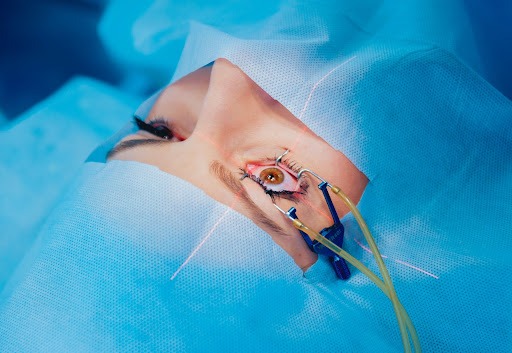Eye Care
Things You Should Know Before Eye Surgery: A Clear Perspective

by admin
26th September 2023
6 minutes read
The prospect of eye surgery can feel a bit daunting. Yet, with the remarkable advances in eye care technology and surgical techniques, these procedures have become incredibly effective and safe. If you are considering eye surgery or have a scheduled procedure, here’s a comprehensive guide to help you prepare.
1. Understand Your Condition
A successful surgical journey begins with understanding your symptoms and the severity of your condition. Whether you’re dealing with cataracts, glaucoma, or a refractive error, take time to research and fully comprehend your condition. Understand why surgery is recommended and what are the potential outcomes and risks.
2. Choose the Right Surgeon
Ensure your surgeon is board-certified and has extensive experience in performing the specific procedure you require. Don’t hesitate to ask about their track record, including their success and complication rates.
3. Learn About the Procedure
Make sure you’re fully informed about the procedure. Whether it’s a straightforward operation like cataract surgery, a complex one like retinal detachment repair, or a refractive surgery like LASIK, it’s essential to know what the surgery involves, its duration, what kind of anesthesia will be used, and the recovery timeline.
4. Preoperative Evaluation
A comprehensive preoperative evaluation will be carried out to ensure you’re a suitable candidate for the surgery. This might include an assessment of your overall health, detailed eye examinations, and sometimes, specialized tests.
5. Health Optimization
Your overall health can impact your surgery and recovery. If you have chronic conditions like diabetes or high blood pressure, ensure they’re well controlled. Inform your surgeon about all medications you’re taking, as some may need to be stopped before the procedure.
6. Know the Risks
While modern eye surgeries are generally safe, all surgical procedures carry some risk. Potential complications can range from minor issues like temporary dry eye to more serious ones like infection or vision loss. Understanding these risks will help you make an informed decision.
7. Preparing for Surgery
Most eye surgeries are day surgeries, meaning you can go home the same day. Arrange for a companion to accompany you and ensure you have a comfortable space at home for your recovery.
8. Postoperative Care
Postoperative care is just as important as the surgery itself. You’ll likely need to use prescribed eye drops and attend follow-up appointments. Protect your eyes from trauma and bright light, and avoid activities like swimming or heavy lifting until your doctor advises you can resume them.
9. Setting Your Expectations
Every patient’s healing process is unique. Some may notice immediate improvement, while others might take weeks or months to achieve optimal results. Discuss expected outcomes with your surgeon to adjust your expectations accordingly.
10. Costs and Insurance
Understanding the cost of the procedure and what your insurance covers can prevent unwelcome surprises. Check with your insurance provider about what’s covered and what you’ll need to pay out-of-pocket.
What to Expect During an Eye Surgery?
Eye surgery procedures can vary widely based on the type of operation being performed, but there are some general elements you can expect:
Preparation: Once you arrive at the surgical center, your medical team will take you through the pre-operative procedures. This may include checking your vital signs, reviewing your medical history, and preparing the surgical area.
Anesthesia: Most eye surgeries involve the use of local anesthesia, often in the form of eye drops or an injection around the eye, to numb the area and prevent discomfort. In some cases, you might also receive sedation to help you relax, or general anesthesia, where you will be asleep during the procedure.
The Procedure: The duration and specifics of the procedure will depend on the type of surgery. For example, during cataract surgery, a small incision is made in the eye to remove the cloudy lens and replace it with a clear artificial lens. In LASIK surgery, a laser is used to reshape the cornea to correct refractive errors. During the surgery, you may be aware of light, movement, or touch, but you should not feel any pain.
Post-Procedure: After the surgery, you will spend some time in a recovery area while the effects of the anesthesia wear off. The medical team will monitor your vital signs and provide post-operative instructions. Most eye surgeries are outpatient procedures, meaning you can go home the same day.
Recovery: Once at home, you should rest and avoid any strenuous activities. You might have to use specific eye drops to prevent infection and inflammation and to support the healing process. Your vision might be blurry initially but should improve over time. You will have follow-up appointments to monitor your recovery and to ensure the surgery’s success.
Remember, everyone’s experience with eye surgery may be slightly different, based on the specific procedure and individual health status. Therefore, it’s important to have detailed discussions with your healthcare provider about what to expect during your eye surgery.
Conclusion
Eye surgery can significantly improve your quality of life. Being well-informed about your condition, the procedure, and what to expect before, during, and after the operation can make the process less intimidating and more empowering. Always remember that your medical team is there to guide you, so never hesitate to voice any concerns or ask any questions. With adequate preparation, you can approach your eye surgery with confidence and optimism for improved vision and eye health.
How Can Medfin Help?
Medfin is a daycare surgery expert providing access to the latest surgical procedures and top doctors in your city at affordable prices. Medfin provides you access to top doctors and surgeons with 10+ years of experience . With Medfin, you can leave your hassles behind and focus on your health. From instant consultations to paperwork assistance, we have got you covered with everything. So why wait? Call us today!
FAQs
1. What kind of tests will be done before an eye surgery?
Before surgery, your eye surgeon will perform a detailed eye exam to measure your eye, assess your vision, and identify any potential issues. This can include corneal mapping, measuring your eye pressure, and assessing your retina’s health.
2. Should I stop taking my current medications before my eye surgery?
Tell your doctor about all the medications you’re currently taking. They might advise you to temporarily stop certain medicines, like blood thinners, before the surgery.
3. Will eye surgery be painful?
Eye surgeries are usually performed under local anesthesia, so you shouldn’t feel any pain during the procedure. You may feel some discomfort or pressure, but any severe pain should be immediately reported to your surgeon.
4. Will I be awake during the eye surgery?
Most eye surgeries are done under local anesthesia with sedation, so you’re awake but relaxed and shouldn’t feel any discomfort. However, you’re likely to be sleepy and may not remember much of the procedure afterward.
5. What should I bring on the day of my eye surgery?
Typically, you should bring your ID, insurance information, any necessary paperwork, a list of your current medications, and a companion to drive you home post-surgery. Wear comfortable clothing and avoid wearing makeup, jewelry, or contact lenses.
CATEGORIES
- ACL Reconstruction
- Anal Fissures
- Anal Fistula
- Appendicitis
- ASK A DOCTOR
- Benign Prostatic Hyperplasia
- Breast Lump Excision
- Cataract
- Circumcision
- Conditions & Diseases
- Cosmetology
- Covid-19
- Cure
- Endocrinology
- ENGLISH VIDEOS
- Eye Care
- Gallstones
- General Surgeries
- Government Schemes
- Gynaecology
- Gynecomastia
- Health
- Health Insurance
- Hernia
- hindi
- Hip Arthoscopy
- Hip Replacement
- Hip Replacement Surgery
- Hydrocele
- Kannada
- Kidney Stones
- Knee Arthroscopic
- Laparoscopic
- LASER
- Latest Treatments
- Lifestyle
- Liposuction
- Medfin Stories
- Medicine
- Nephrology
- Ophthalmology
- Orthopaedic
- Paraphimosis
- Patient Testimonials
- PCL Reconstruction
- Phimosis
- Piles (Hemorrhoids)
- Pilonidal Sinus
- Proctology
- Prostate Artery Embolization
- Rhinoplasty
- Second Opinion
- Total Knee Replacement
- Uncategorised
- Urology
- uterine artery embolization
- Uterine Fibroids
- Varicocele
- Varicose Veins
- Vascular
- VIDEOS






